
Guardians of the Galaxy 3 is, probably, the best movie Marvel could’ve released right now, the reason being that IT’S ITS OWN THING. The problem Marvel’s been facing lately is that all of its movies have been intertwined with one another, and while that was great when the MCU was cooking, it’s become the world’s draggiest anchor ever since it entered its Marvels/She-Hulk/Dr.Strange era.
Still, I couldn’t muster the enthusiasm to get myself to go watch the end of Starlord’s trilogy. There were two main reasons why. One, the film looks sad! It looks like it’s going to lean heavily into its feels and that’s not why I go to see big Hollywood films. It’s why I watch smaller films and some TV shows. But when I go to see a big movie, I want to have fun. I want my spirits to be lifted, not dragged down to Sadsville.
And to be honest, I don’t think Guardians has earned the right to have a big emotional ending. This isn’t Iron Man after 20 films. This isn’t Luke Skywalker at the end of the greatest trilogy ever. It’s Chris Pratt, people in weird makeup, and CGI creatures acting goofy in space. Let’s be real here. People aren’t asking for Manchester by the Sea when they’re watching gun-wielding raccoons.
Then, of course, there was that second movie. That second movie was awwwwwful. It was weird. It was bumpy. It ditched its main character in favor of focusing on its two villains. Had that movie been good, I probably would’ve seen Volume 3 regardless. But the stink from that misfire still lingers in the back of my nostrils.
I’m so hot and cold when it comes to James Gunn. Never connected with his pre-Guardians content. Love Guardians Volume 1. Hated Suicide Squad. Loved the Peacemaker show. Hated Guardians Volume 2. I’m actually excited to see what he does with DC because he has an opportunity to dethrone the flailing Marvel. But this one? This Guardians 3 movie? I’m sitting this one out.
So, after my No Guardians For Me temper tantrum I just made you endure, did I give up on the weekend? Absolutely not. I did watch something. And that something ended up totally surprising me. It surprised me so much that I did research on the creator, Graham Yost, only to find out he was the writer of SPEED, one of the best action movies ever!
The show I watched was called Silo, which is a post-apocalyptic story about people who live in a giant underground silo city. Every once in a while, someone demands to go outside, convinced that the air isn’t poison and that humans can, once again, live on the surface. But all of these people make it a total of about 20 steps before they fall to the ground and die.
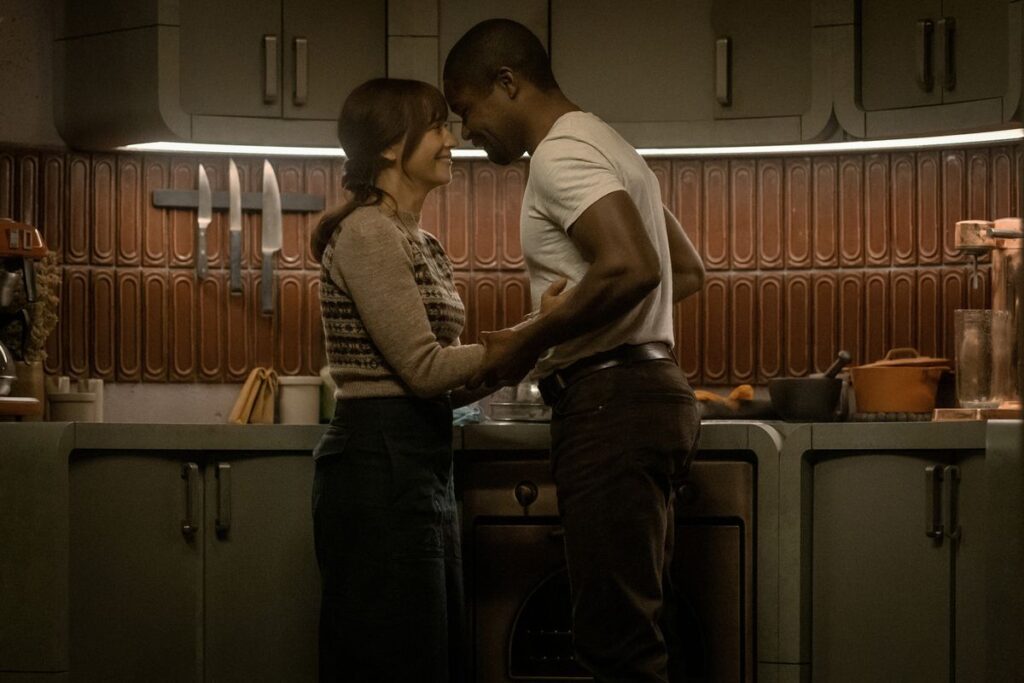
The pilot episode is about the silo Sheriff’s wife, who suspects that the governing body of the silo is lying to them, and that the outside is, indeed, livable. (**spoiler**) So she goes outside. And dies just like everyone else. The sheriff is left heartbroken. But as time goes on, he considers giving the outside a shot as well.
I actually read the book the show was based on (called “Wool,” which refers to the wool everyone has over their eyes) which started as a short story that the author, Hugh Howey, shared with an online group. The enthusiasm inspired Howey to turn the story into a novel (the first chapter in Wool, which was the original short story, is utterly riveting so I’m not surprised people fell hard for it). It’s very much like the “Lost” narrative where there are a lot of secrets and reveals, which makes it ideal for a TV show.
So then why isn’t anyone talking about it? They probably will as word gets out. But I think it has more to do with the fact that Apple has zero concept for how to promote a TV show. None of these streamers do, really, beginning with Netflix. But the thing about Netflix was it was a destination site. You went there looking to watch something then you saw the latest greatest Netflix show being promoted so you checked it out.
Apple TV not only doesn’t have enough material to be a destination site, it’s buried under too many layers of menus and buttons. Every time I fire it up, I feel like I’m turning on a nuclear reactor. Is this where the original shows page is? Or is it over here? I suppose Apple gets some credit for making me feel like a genius every time I find the show I came for. But the poor ease-of-use severely hurts its chances of anyone watching a show on its service.
Then, of course, it doesn’t spend on advertising. Which is bizarre for a company with a 1 trillion dollar market cap. Great shows are going to find an audience no matter whether they advertise or not. But everything else needs to build awareness. Apple literally has a media strategy whereby they don’t tell you about a new show and make it hard to find any show you do hear about. With that strategy, the ONLY way anybody’s going to be able to find your show is if it’s Game of Thrones level awesome. It baffles me that there are smart executives getting paid millions who don’t do anything about this.
Is Silo a great show? I don’t know yet. But the pilot is darn good.
I’m always surprised when something pulls me in. Since I know all the buttons and levers writers are pushing to get me to buy into their story, I’m hyper-aware that whatever I’m watching is being written. For that reason, it’s hard for me to get lost in a show/movie. But I got lost in Silo’s pilot.
What wizardry did the writer use to achieve this?
Well, they start by giving us an intense opening scene then flashing back. Yes, this is a cliche. But they do it well. They start us in the present, briefly setting up the world of the silo before the Sheriff tells the government he wants to go outside. The story makes it clear that this is a death wish, which is a nice way to intrigue the viewer.
That wasn’t what hooked me, though.
What hooked me was the story of the Sheriff and his wife once we flashed back. The entire episode takes place in the past and shows the Sheriff and his wife trying to conceive a baby.
I can’t emphasize this enough – when someone becomes hooked on your story, when they buy in – it’s almost always because of the characters. And it’s almost always because you’re being truthful with those characters. You’re showing us characters who are going through the same trials and tribulations that real people go through. It’s that authenticity that makes us care about them.
All the Sheriff and his wife care about is having a baby. That’s it. That’s all that matters to them. And each day that goes by, each day that they become a little less hopeful, pulls us closer to them, makes us feel more sympathy for them, makes us root a little harder that tomorrow will be the day they get pregnant. By the end of this pursuit, I was in love with these two. I was ready to run through a wall for them.
So when the wife says she wants to go outside, the equivalent of committing suicide, I was heartbroken. Cause I knew what that meant. I knew she wasn’t coming back and I knew that he would be wrecked.
It’s something I try to remind myself of all the time, whether I’m helping another writer or working on something myself. Don’t get distracted by the bells and whistles – the twists, the mysteries, the mythology, the double-crosses. If you make us care about your characters, we’ll follow you through any door. Hell, we’ll follow you right out the silo! Into that poisoned air.
Assuming we can find your show, of course.

If AI was a whisper two weeks ago, it’s become a Wilhelm scream over the last two days. That’s because with screenwriters striking, everyone wants to know if the studios are going to turn to AI to write their scripts. Let’s be honest. This is the dream of every studio in town. To be able to generate scripts without dealing with pesky neurotic inconsistent writers who never entirely deliver on what the studios wanted in the first place.
Can you imagine if you didn’t need to hire and fire Damon Lindelof for the next Star Wars movie? You could merely go to an AI chat bot, feed it an idea, and have the script written in 98 seconds? And pay nothing in the process. That sounds like a sweet deal to me. In fact, we can get a preview of what that script looks like right here. I’m going to prompt Chat GPT to write the opening scene of the recently announced Rey movie.
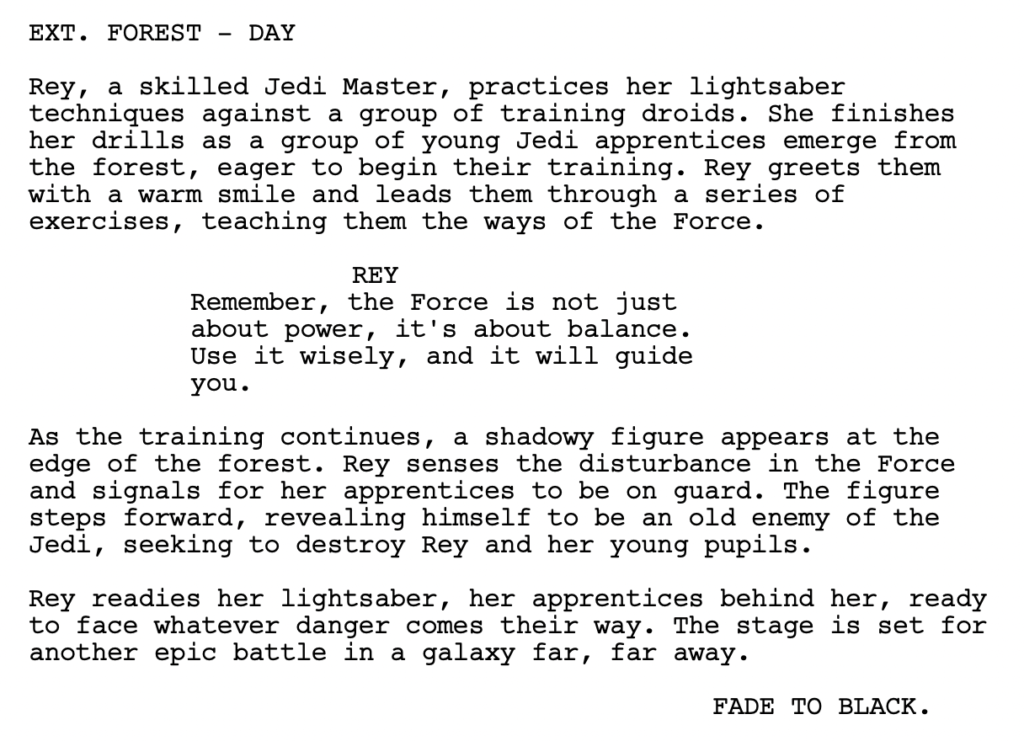
Riveting stuff there, Chat GPT.
I’m here to tell you that AI has no chance of replacing screenwriters. And I’ve got five ironclad reasons why.
It Doesn’t Know How To Be Funny
AI has no concept of humor. Which makes sense. AI is a logic-driven process. It crunches data and approximates how to use said data to give the user his desired result. It’s very nuts & bolts. It doesn’t do funny. And if you can’t do funny, you eliminate a gigantic component of screenwriting.
Even if you’re not writing a comedy, you need to inject humor in places. You’ll always have at least one character who’s comedic. The screenwriters who get the most attention are the ones who have strong voices, and “voice” is synonymous with how a writer uses humor.
I prompted Chat GPT to write a new Seinfeld scene. Jerry and the gang have found his apartment transported to the future, in 2023, and they’re trying to get back to 1992. For clarity’s sake, I prompted GPT to have them already in the future. Yet is still started like so…
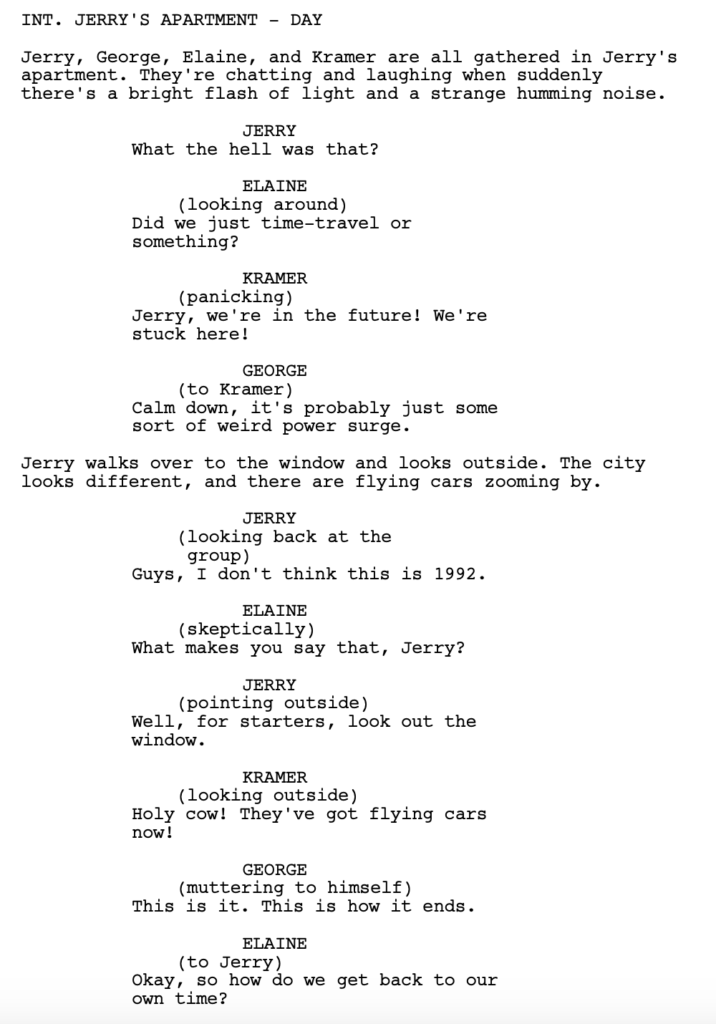
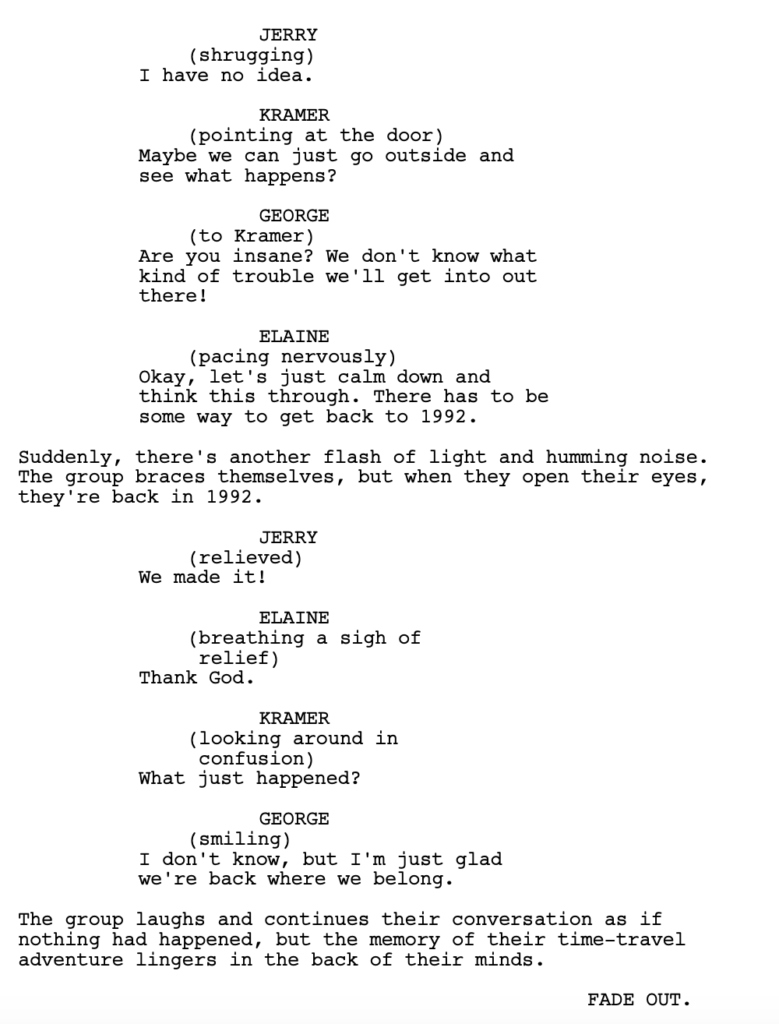
And this is a sitcom that Chat GPT already has tons of data for. So it knows the characters and the kinds of episodes that are written and where the laughs usually come from. Even with all that data, that’s the best it could do. Now let’s see what happens when I tell it to write the same scene with a totally original sitcom, where it has to make up everything. Here’s what it gave me.
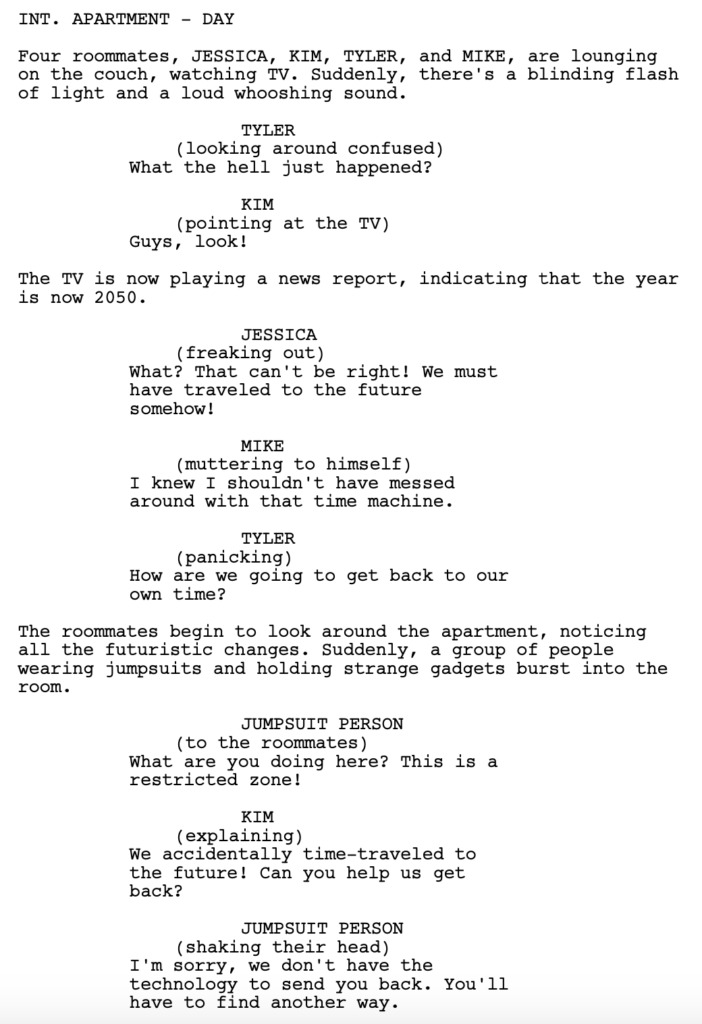
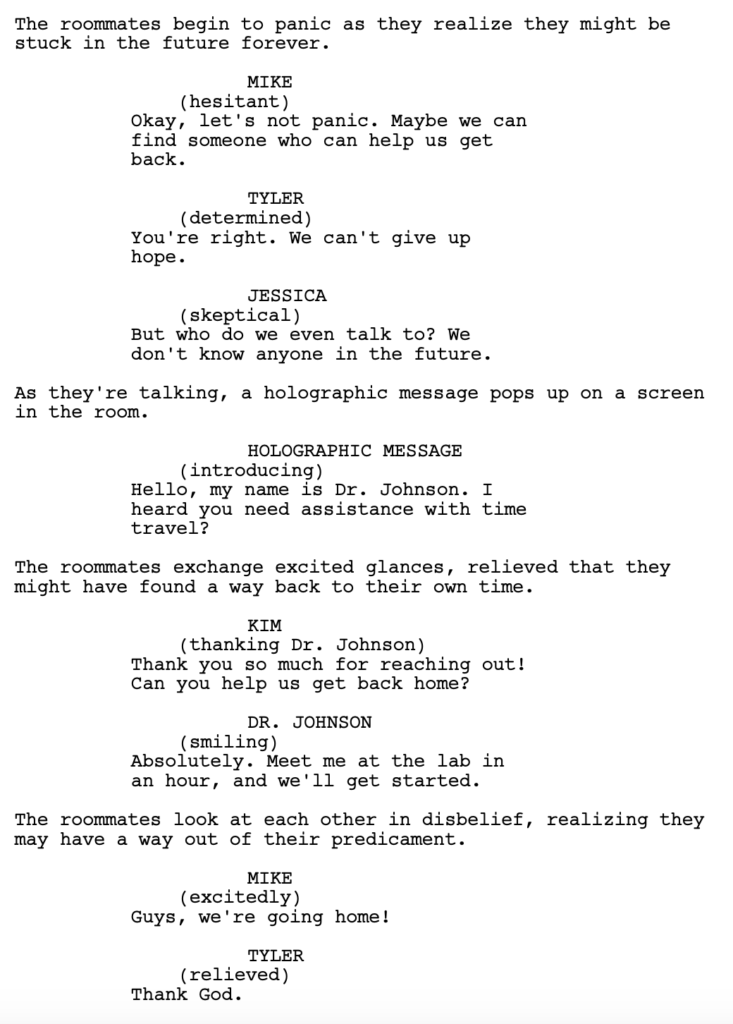

I don’t think there’s even an attempt at a punchline in this scene. It’s safe to say that comedy is the first area where screenwriters are safe.
How Can Something That Isn’t Human Document The Human Experience?
Every story that has ever been written is a reflection of the universal human experience. When someone writes about love, it reflects their own experiences with love. When someone writes about the devastation of losing a loved one, it’s because, either directly or indirectly, they have experienced that feeling of loss. Heck, when someone writes about losing their virginity, they are drawing upon their own experience of losing their virginity.
How can a computer ever cover these things in an authentic way? This is the secret sauce in screenwriting that you don’t really think about. You need to bare your soul in your writing if you want your stories to resonate with others. Neil Gaiman talks about this. That nobody paid his writing any attention until he started writing “the truth.” The truth being our true life experiences, the ugly stuff we’re ashamed about, the things we’re embarrassed of, the messy stuff that occupies the shadows and crevices of our existence. That’s what makes a story connect with other people.
I’ve been watching the Hulu show, Dave, lately. It follows a rapper trying to make it big. Dave spends a lot of time in his show focusing on his insecurities about his body, particularly in relation to sex. There’s a lot of fear and shame and confusion that occurs whenever he has sex. That’s an exclusively human thing that a computer could ever replicate. Why? Because a computer has never had to go through that before.
It’s a Litigation Nightmare
The dirty little secret about AI’s journey into art is that it steals. It says it doesn’t. It says everything it generates – pictures, paintings – all comes from its “imagination.” But a funny thing happened not long ago. Someone prompted the AI to generate a photo of a slide tackle in soccer. It came up with this.

Look a little closer. You see something there in the middle right side? It almost looks like a watermark. Here’s another REAL photo that happened to already be on the internet.

Looks similar huh? And what’s that there? Is that a Getty watermark? Ahhhh-haaaaa. Looks like we just caught AI in a big fat case of plagiarism. Obviously, AI is taking real photos and real paintings to create art. It’s stealing. And you can bet your bottom dollar that the second AI “writes” some scene into a movie that’s eerily similar to a scene from an unsold screenplay on the internet, or even a scene from another produced movie, that that studio is going to get sued up the wazoo.
This is going to happen with characters, scenes, concepts, dialogue. They could potentially get sued from two-dozen different directions if you believe that AI is crowd-sourcing data from every corner of the web to come up with their screenplays.
If you’re a studio, why put yourself in that position? Just buy a single writer’s script and you don’t have to worry about any of that.
Its Costs Are Going to Skyrocket
Recently, it was discovered that AI used Reddit as a huge language source for the way it thinks and acts. So Reddit said, we’re not just going to give you that data. We’re going to charge you for it. This is going to be a business that explodes over the next few years.
Every single company, Reddit, CNN, the New York Times, Twitter, Instagram, blogs — anything that has lots of data – is going to start charging AI to use it. Which means AI is going to have to pass those costs on to others. YOU. You’re going to have to start paying for AI. And for every corner of the internet that AI will have to pay money to use, those costs to the consumers are only going to rise.
What that means is that a producer is not just going to be able to get a Chat GPT screenplay for free. They’re going to have pay for it. And the costs are going to keep getting higher as people figure out how AI is getting its information and making sure that they have to pay to get that information.
It Cannot Offend
This is the whole ball of wax, as far as I’m concerned. It’s the smoking gun as far as why screenwriters will never have to worry about AI replacing them.
AI cannot offend. It’s not allowed to. It’s being reprogrammed EVERY SINGLE DAY to be less offensive than the day before. This is happening because the AI companies are terrified of AI saying something offensive. Because that means THEY’RE offensive. And they can’t let that happen.
The thing about writing is, if you want to write anything that has any sort of power to it, it’s hard to do so without offending someone.
AI could not have written Inglorious Basterds. German people could say it’s offensive and stereotypes them. AI could not write The Whale. It’s offensive towards overweight people. It would refuse to write Veep, as there’s way too much swearing and mean-spiritedness. It wouldn’t write Academy Award winning Promising Young Woman, as the subject matter of rape and revenge are tricky to navigate and may trigger someone. It couldn’t write 13 Reasons Why. The series might cause someone to commit suicide. It would refuse to adapt Anna Karenina, as there are no people of color in that story. It couldn’t write Beef because the show routinely makes Asian-Americans look dangerous and incompetent. It couldn’t write Super Mario because Italians don’t want to be stereotyped as cartoon plumbers.
American Beauty, Doubt, The Hunger Games, Jojo Rabbit, Get Out, Mad Men, Joker, Three Billboards, Spotlight, The Passion of the Christ, Room, Silver Linings Playbook, American Sniper, South Park, Deadpool, The Sopranos, Vicky Cristina Barcelona, Juno, Crash, White Lotus, Suicide Squad, both the British and American Office.
AI would not have touched a single one of those stories as they each have something in them that could potentially be perceived as offensive.
I’m not even convinced it could write Top Gun Maverick, as the bad guys are vaguely implied to be Russian, and the AI would refuse to stereotype an entire nation.
What this means is that AI would only be able to write the most vanilla of vanilla screenplays. The safest of the safe. You wouldn’t feel a single emotion because AI would go out of its way to avoid anything that might cause emotion!
People have said, “Yeah, but AI is only going to get better.” That’s true. But we’re also only going to get more sensitive. So it doesn’t matter how good it gets if it still has to avoid ten million offensive pitfalls every time it writes a screenplay.
The only entities who can write stories are people because people are still allowed to shine a light on the dark crevices of life. People are allowed to shine a light on the corruption inside the Catholic Church. People are allowed to write a pro-life movie like Juno and tackle the contentious underbelly of that subject matter. People are allowed to highlight the kinds of inadvertently offensive people who we find ourselves around every day, like Michael in The Office. AI is not allowed to do that. Which is why writers will always be safe.
Wrapping this up, do I think that AI could come up with a really clever plot like the movie, “Missing,” which I just watched? Do I think it could come up with a whopper of a twist, like “The Sixth Sense?” I honestly don’t know. I think it has a better chance of figuring out how to plot a movie since plotting is technical.
But plot is so closely interwoven with character. And “character” is the thing that I don’t think AI will ever figure out. Because it’s elusive. You can’t come up with a mathematical equation to write a great character. And, like I said earlier, AI doesn’t understand the human condition. It can’t. It’s never lived a human life. For that reason, every screenwriter in Hollywood can sleep soundly. You’re not going to be replaced.
Genre: Comedy/Action
Premise: An everyday guy who accidentally starts working as a barista inside the CIA headquarters building gets lured into a spy mission by a beautiful secret agent, known only to him as Carmel Machiato.
About: This script finished on last year’s Black List with 12 votes. The writers, Nico Bellamy & Chase Pestano, are very green. They have the type of IMDB credits that seem unsure of themselves, stuff like, “talent coordinator” for “The Voice.”
Writers: Nico Bellamy & Chase Pestano
Details: 114 pages
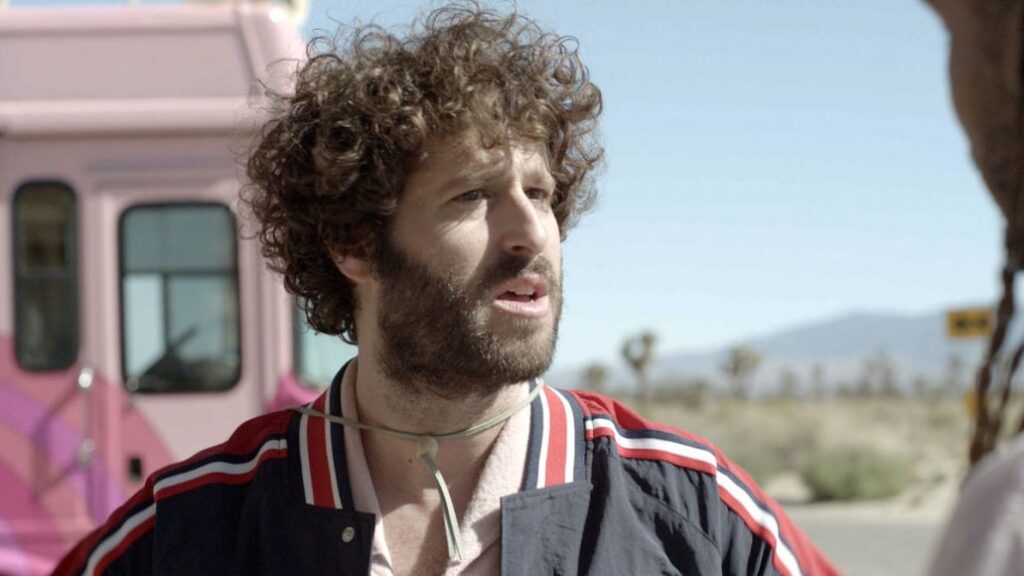 Lil Dickey for Dick?
Lil Dickey for Dick?
Yesterday’s script was quite heavy. And with this writer’s strike, there’s an overall gloom in the air that’s getting everyone down. So I thought, let’s read something fun today – a comedy!
I was actually talking with a producer earlier today about comedy and The Hangover came up. I asked the question…. When’s the last time there was a good comedy??? I get that most comedy writers have moved to TV. But I find it hard to believe it’s *this* hard to write a good comedy feature film, to the point where nobody’s written one in a decade.
As I’ve said here many times before, when it comes to comedy, if I don’t laugh out loud in your very first scene, your comedy script probably sucks. My confidence-o-meter drops 90 points if I’m not laughing in that first scene. So that’s going to be the first test for The Americano.
I’ll tell you if it passed after the plot breakdown.
Dick Freeman is not exactly “killing it” in life. He’s in his mid-30s, he still lives at home, he doesn’t have a job, and his only source of socializing is with his online virtual reality game set, where he mainly teams up with pre-teens to take down other virtual pre-teens in first-person shooter games.
But Dick’s mom is getting restless. She’s just met someone. She’d like him to move in. But it’s not going to happen if Dick continues living here. So she tells him he has to move out. But how is he going to pay for moving out, he asks. You’ll have to get… A JOB.
Dick is mortified by this requirement. Jobs are hard. They’re stress-inducing. You have to leave your house to go to them. After a lot of whining, he agrees to take an interview at Starbucks. But on his way there, he’s ATTACKED, kidnapped, and taken to a dark room. His captors confirm his name, that he has no friends, that he’s never had a girlfriend, that he doesn’t do anything productive or useful. And that’s all they need to know. Welcome to Starbucks!
It turns out these were CIA agents screening him for his new Starbucks job in the main CIA building. The reason he was chosen, they tell him, is because he’s the ultimate loser and not in danger of making any connections with any other human being, considering that he’s so socially inept.
The funny thing is, Dick’s actually pretty good at his job. And one customer, a pretty female agent who always orders a caramel macchiato, takes a liking to him. One day, after work, Dick realizes that she left him a message on one of the cups. It’s an address. Dick heads to the remote location – a deserted church – and Caramel Macchiato proceeds to tell him that there’s a double-agent inside the CIA and they’re working with the Cubans to potentially do something dangerous.
Since nobody would suspect the coffee guy, she enlists his help to steal data from the CIA director’s computer. Somehow, some way, Dick is able to do this. But when Caramel’s hacker bails on his file-decrypting duties, she’s forced to use one of Dick’s people, Dragon, a pre-teen he plays Fortnite with.
Before Dick realizes it, he’s in the middle of a live CIA secret mission. But when he suspects that Caramel is using him, he realizes that the next venti iced latte with three shots of espresso, one pump of caramel syrup, one pump of peppermint syrup, a sprinkle of cinnamon, a dash of sea salt, and dollop of whipped cream he makes could be… in the afterlife.
All right. So I know you’re on pins and needles here. Did I laugh during the opening scene? Here’s the scene so you can decide yourself if it’s funny.
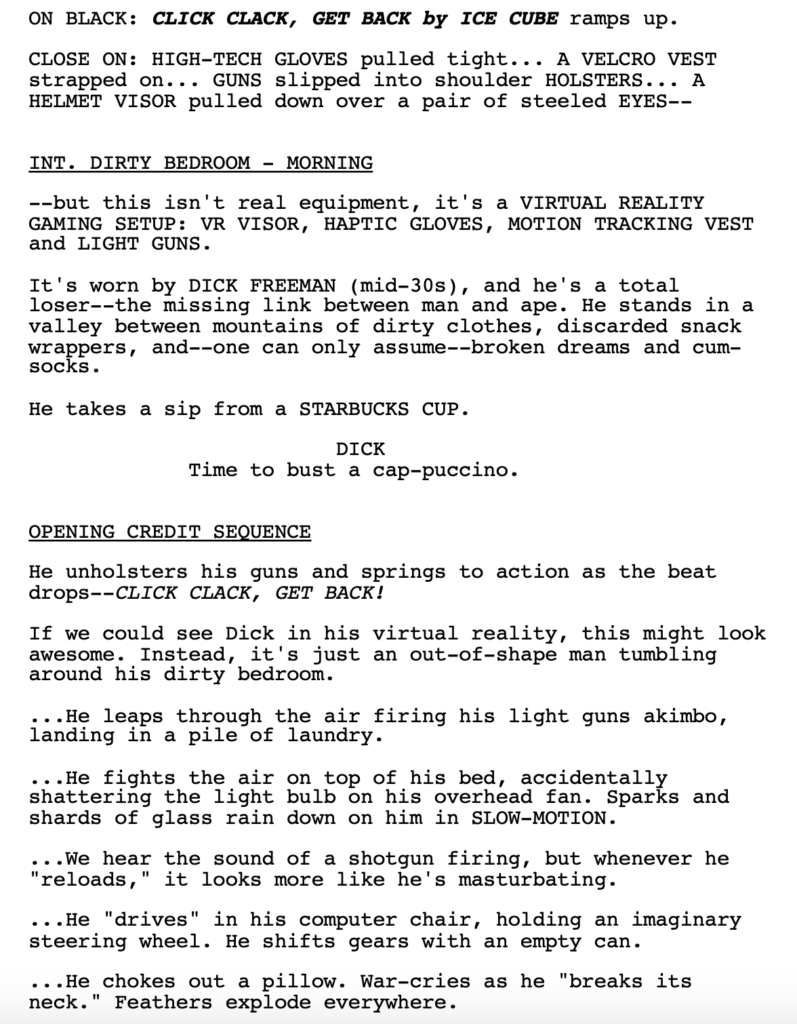
I thought THIS WAS HILARIOUS.
I could totally imagine whoever’s the current “young Jack Black” going crazy in this scene. Remember, one of your jobs as a screenwriter is to put the actual image of what the reader is going to see in their heads. I thought the writers did an A+ job of that. I literally felt like I was watching the movie. And it was a funny image to boot. So the script passed the first test with flying colors.
Remember, if you come up with a funny main character, he does most of the hard work for you. Because we’re probably going to be laughing at most of the scenes in the movie since he’s in them.
And I didn’t just like the goofiness of the character. I liked the essence of him. That he was, basically the single biggest loser in the world which, ironically, is why he gets hired. That’s hilarious. If he was social, the people he knew could be used against him. If he was cool, he might potentially form relationships at the CIA. He needed to be the world’s most pathetic individual to get this job. That setup right there is gold. Cause I’m laughing even before I see him work.
In general, I like “in over your head” comedy. You risk a little bit when you make your hero incompetent. If a protagonist is too dumb or too idiotic, the reader can rebel against them. Hubie Halloween comes to mind. But as long as he’s funny, we’ll forgive a lot of that incompetance.
Where the script runs into some trouble is with the plot. It’s not that the plot is bad but it’s not very funny. In comedy, we love those initial moments of watching our funny protagonist deal with his situation. But around page 45, fifteen-to-twenty minutes into the second act, we start to get used to the joke. So if your plot doesn’t kick in and add something funny, we start to lose engagement. We’re still watching. We’re still laughing here and there. But we’re not INVESTED.
This is why comedy is so hard. You gotta have a hilarious main character, which is hard enough. But then the plot has to create funny situations as well. Yesterday, I highlighted that inventive railroad heist set piece. You need to do the same thing with comedy. You need to come up with big hilarious set pieces. And this script was missing that. Which is a problem because there’s no such thing as a great comedy film that doesn’t have memorable comedy set pieces.
I’m on the fence with this one because it started out well. And although it never got bad, it started coasting. Still, I think it’s better than most of the comedy scripts I’ve been reading lately. So, for that reason, I think it’s worth the read.
[ ] What the hell did I just read?
[ ] wasn’t for me
[x] worth the read
[ ] impressive
[ ] genius
What I learned: If you’re going to include the CIA and its agents in your screenplay, the audience is expecting HIGH STAKES. This script shot itself in the foot by making the bad guys Cubans. It just felt like a second-rate foe. And you may think that shouldn’t matter in a comedy. But it does. The higher the stakes, the more we care. The more we care, the more tension builds up in our bodies. The more tension we have, the more we need a release. And how do we get that release? Laughing. If this was a small-town comedy then, no, the bad guys shouldn’t be Russia or China. But a CIA movie, yes. You need big enemies and big potential consequences.
Heat meets The Town meets… Secretariat?
Genre: Crime
Premise: A horse veterinarian who uses his practice as a cover to treat injured criminals finds himself targeted by a corrupt cop, who needs him to help rob the Thoroughbred Cup.
About: This script just sold for a million dollars to Amazon, which beat out Netflix in the bidding. We don’t get many big spec sales these days unless they’re in the short story format, so this is exciting. It comes from the writer of Ballast, that nifty script about a car ferry that has a bunch of its cars rigged with bombs. Some thought it was a little too “thinking man” for a fun action script but I liked it. Today’s script feels like it better matches the writer’s heady-thoughtful writing style. Let’s see how it turns out.
Writer: Justin PIasecki
Details: 116 pages
 Succession’s Jeremy Strong to level up to feature film leading man?
Succession’s Jeremy Strong to level up to feature film leading man?
By the time you read this, screenwriters in Hollywood may be on strike. It’s going down to the wire. Obviously, this is going to be rough on everyone. If you’re a writer, there will be no work. If you’re a studio, you have nobody to write your movies or shows.
However, the one good thing to come from an impending strike is that it gets studios trigger-happy. They need content in case the strike goes on for a while. Which is how we end up with today’s sale. This script is said to have been purchased exclusively because of the impending strike. So good for Justin for taking advantage of an opportunity.
Nick Easter, a 40-something horse vet, has been a Chicago guy his whole life. Nick’s been dealt a few harsh blows lately. His wife died and his 17 year old addict son is stuck in juvie. Since regular vet work isn’t paying the bills, Nick has taken to outfitting his practice with a secret underground medical facility for gnarly Chicago criminals.
It’s pretty easy to pull off, actually. You just order a little extra horse medicine and you use it on the humans. Well, easy is about to get hard. Because a group of Chechens try to steal Nick’s boss’s medical shipment, which just happens to have a plethora of heroin in it as well.
The cops think it’s a standard drug deal gone bad until they find traces of horse manure in the truck. This sends them on a roundabout trip that ends up at Nick’s secret doctor’s office. Surprisingly, the cop who discovers him doesn’t want to arrest him. He wants Nick to help him rob the place where Nick works, Hawthorne Racetrack. The Thoroughbred Cup is coming up and millions of dollars are going to be bet there that day.
Of course, Nick says no way. But our cop reminds him that he just might pay a visit to the local juvie hall and, oh, I don’t know, stash some heroin under Nick’s son’s pillow. If he does that, juvie may be a fond memory compared to where the son is going next. So Nick is stuck doing the job. Saddle up everyone. We’re about to experience the mane event.
Something it took me a really long time to figure out was that crime is a great way to write a character piece that Hollywood actually wants to buy. When I first started writing, I was writing all these dramadies that were, essentially, character pieces with a little bit of humor in them. Nobody wants to buy those. Those scripts only get made if they’re directed by the writer themselves.
Crime, on the other hand, sells. Because crime ups the stakes of everything. Now there are guns involved, drugs involved, theft involved, people are actually dying. You can build a marketing campaign around that. Heck, just put a well-known actor on a poster with a gun and people will go to see that movie. It’s much harder to get investors or studios if all you’ve got is characters trying to make it through life.
Case in point, Red Rocket is one of my favorite movies of the last two years. But NO ONE HAS SEEN IT. Cause it’s an offbeat coming-of-age love story. The only reason it got made was because the writer is well known and he was also the director.
Which is me telling you, if you’ve got a character piece that doesn’t have a hook, consider turning it into a crime film. Cause it all of a sudden becomes a million times more marketable. It’s one of those few times that crime does pay.
That doesn’t mean writing these is easy. With crime films, the problem is always that they feel the same. Grungy looking serious people dealing with criminal problems, occasionally pulling out their guns and firing them then jetting off until they deal with their next skirmish. So how do you differentiate yourself?
You gotta find one or two unique elements to hang your concept’s hat on.
Imagine yourself hanging out with a friend, who, of course knows you’re a screenwriter, and they ask you, “What are you working on right now?” Imagine answering that question. Would your answer make that friend believe that you’ve got something cool on your hands? Or would your pitch, no matter how you spun it, sound like every other crime movie out there? Cause if it’s the second one, you’re working on the wrong idea.
With this script, it’s the horse angle. Why is that unique? Cause I’ve read hundreds of crime scripts and I can only think of a couple that dabble in this subject matter. That’s it. That’s all you need. If you have that, chances are you’re in good shape. If you would’ve told me it’s a script about bank robbers or drug dealers or a guy who gets in trouble with the Russian mob, we’ve got a problem.
The big payoff scene in Stakehorse is reminiscent of the famous bank robbery in Heat. It’s not quite to that level. But it has the same intensity as that scene. In it, Nick’s boss takes a group of criminals on one of those truck-train combos that can ride on train tracks. Knowing when a brinx truck is going to be coming to a train crossing, they’re able to close the crossing gates, blocking the truck (as well as the rest of the traffic) there.
They then blow the tires off the thing and use some elaborate tools to get into the truck. It’s a really cool scene mostly due to the fact that you haven’t seen it before. It’s SO HARD in these crime films to come up with fresh set pieces but this was totally fresh. My one complaint – and it’s something I can’t believe Piasecki didn’t think of – was that he didn’t have an unscheduled train show up, barreling towards them, adding a super intense ticking time bomb to the scene. But it was still cool!
The biggest problem I have with this script is that it reads thick. By that I mean, it’s one of those scripts where if you miss even one action or dialogue line, you might be confused. So you have to concentrate a lot more to keep up with what’s going on.
Yeah yeah. Technically, that’s what a script should be – every line contains relevant information. But you can definitely go overboard with that, and if you’re writing a script with a lot of characters and nuance and exposition and detail, it can start to feel like work reading the script.
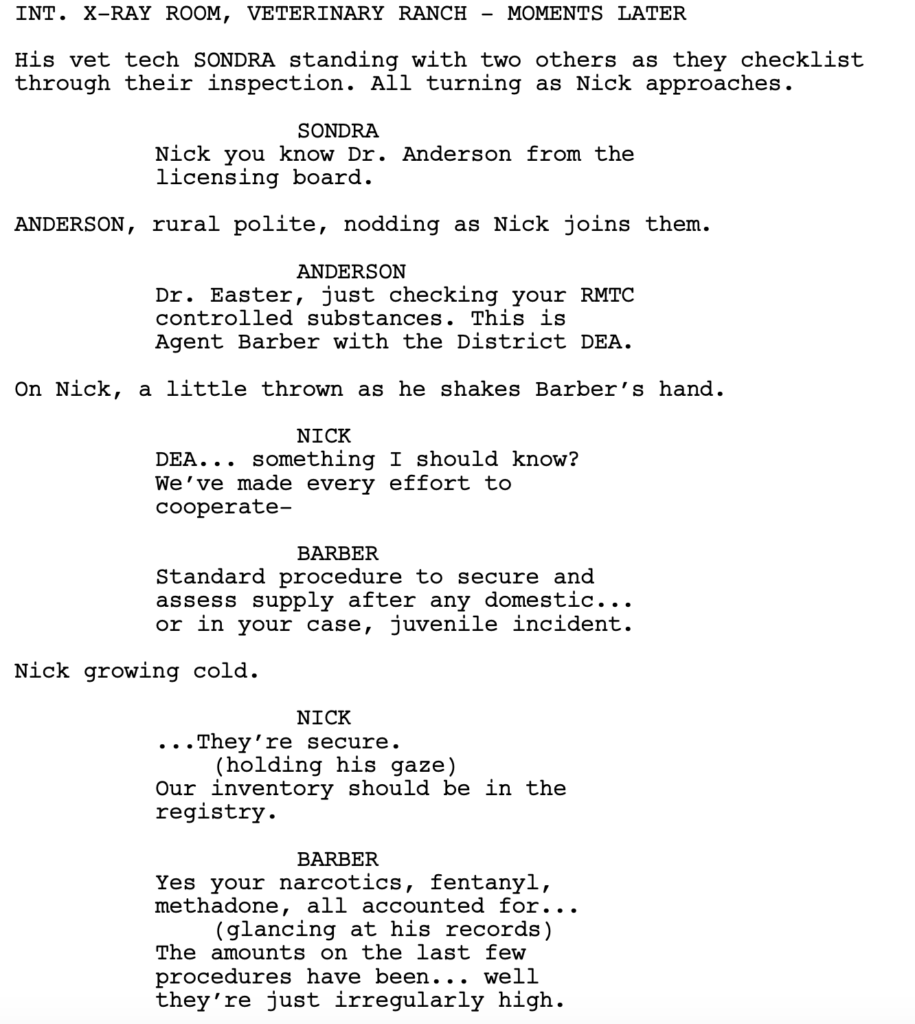
Go back and read Friday’s script, which is one of the easiest reads you’ll have all year then read this script, and you’ll see what I mean. I’m not saying it’s a bad thing. You can certainly get away with it if you’re a good writer, like Piasecki. But I don’t like scripts where I check that page number, thinking I’m on page 30, and I’m only on page 12. That tells me your script is too dense, in description, information, plot, or all three.
Still, I thought this was good stuff. If you liked The Town, you’ll love this script.
[ ] What the hell did I just read?
[ ] wasn’t for me
[x] worth the read
[ ] impressive
[ ] genius
What I learned: There’s always a more clever way to say something. Early on, when the cops are traipsing through a truck crime scene, they note that there are a couple of dead bodies in the back of the drug truck. How would you refer to those bodies in dialogue? Most writers would write something like, “We got a couple dead bodies back here!” The less lazy writer might add a little more flourish, saying something like, “We got two big beefy corpses back here.” Piasecki goes with something better than both of these: “I figure we got a buy gone wrong. Driver catches an unlucky one in the front. A hundred and twenty kilos of brown and five hundred pounds of dead Chechens in the back.” “Five hundred pounds of dead Chechens” is a much more clever way to refer to two dead bodies.

Did we get duped?
All along, were the Russos, actually, bad filmmakers?
This is a bold, maybe even triggering, accusation.
But the question needs to be asked because I watched Citadel this weekend, the gigantically budgeted new Amazon show that uses the words “highly enriched uranium” in its very first scene — WHAT YEAR IS THIS? 1984??? — and it was created by the Russo brothers.
The show’s 51% Rotten Tomatoes score clearly isn’t accurate as the show can’t be measured in ripe and rotten tomatoes. It must be measured in those mass produced faded tomatoes you find at the big brand supermarkets, the ones so devoid of taste, you wonder if they can even legally be called tomatoes. If we’re measuring this show by those tomatoes, it gets 100%. Because it is 100% bland.
Since their Marvel experience, the Russos gave us their gritty miscast character piece, Cherry, which I hear did quite well at the cast and crew screening, the only people who actually saw the movie. They then gave us The Gray Man, possibly the most generic piece of action filmmaking the universe has been subjected to. And now this. This…. Whatever Citadel is. If nobody had told me, I might assume it was a very long commercial for a new fragrance.
The Russos have long been an anomaly. They were comedy directors, giving us the Owen Wilson film, “You, Me, and Dupree.” They then became TV show directors, helming episodes of Arrested Development, Happy Endings, and Community.
People thought Kevin Feige had lost his marbles when he gave the Russos a Marvel film (Captain America: Winter Soldier). But they delivered. That got them Captain America: Civil War and then the Avengers films, which turned them into household names.
But are the Russos merely beneficiaries of the Marvel formula at a time when it was at its most potent? Or are they actually exceptional?
Hollywood is a strange place that has the power to make people and things look bigger and better than they actually are. It’s a spin zone, the most formidable of all time. They can spin you up or, when they no longer need you, spit you out. It’s that spitting part that exposes you – that leaves you naked and bare. Those who were actually good survive this spitting. Those who don’t churn out an endless stream of tomato compost.
I watched this Jennifer Lawrence trailer for her latest movie, No Hard Feelings. The film, about an older woman who gets paid by a couple of parents to help their son lose his virginity before he goes to college, is the result of Lawrence “taking control of her career” and making her own choices, as opposed to doing her agents’ bidding. It literally looks like the worst film of all time.
I see that streak Lawrence was on with Hunger Games, Silver Linings Playbook, and American Hustle, and she just looked invincible. When you saw her getting nominated for Oscars, you didn’t bat an eye. It made sense because the Hollywood machine told you it made sense. This was one of the greatest actresses of our generation, they said, and we nodded like zombies who’d been promised fresh brains for dinner.
Since then, she’s made Red Sparrow, Serena, X-Men Apocalypse, Joy, Passengers, Mother, Dark Phoenix, Don’t Look Up, and Causeway – a stretch of extremely mediocre films. So which one is the real Jennifer Lawrence? Is it the one who went on that first streak or this one?
There’s an argument to be made that it’s so hard to make anything good in this town that if you can make even ONE great film, you’ve done the impossible. And if you can make three great films? You’ve done something 99.99999999% of people who come to Los Angeles never achieved. That cannot be a fluke. So why not celebrate that instead of focusing on all the duds they made?
Fair. But when you make five bad movies in a row (or six, or seven, or eight), it’s hard not to question whether you were as good as everyone said you were. Maybe the powers that be knew how to protect your weaknesses as an actor, or, in the Russos’ case, as directors.

If you’re looking to watch something actually good, I suggest staying away from Amazon’s solipsismistic snafu, and starting up Beef, on Netflix. I know some people have had a problem with this series because Amy Lau (Ali Wong) is the single most unlikable person on the planet. But if you push past the first couple of episodes, she becomes more tolerable.
The series is about a down-on-his-luck landscaper, Danny, who gets in a road rage incident with the CEO of a Goop-like wellness company, Amy. Danny chases her down, finds out her name, and starts stalking her. She retaliates in kind. And the two go back and forth at each other, the stakes escalating each time, until they’re at life-destroying levels.
There are a couple of great screenwriting lessons the series teaches us, the most obvious being the power of conflict. This entire series is built around a strong case of conflict. But conflict all on its own can’t carry a story. And it definitely can’t carry 10 episodes of television. You need something more.
So the second thing we’ve got is CLASS. These aren’t two rich people going at it. It’s not two poor people battling. It’s one rich person and one poor person. This turbo-charges the conflict because now we’ve got a class war. Also, in that initial interaction, Amy “wins” the road rage duel. Which creates an underdog scenario. Because, now, we want Danny to get her back. That’s why we’re going to tune in to the next episode. And the episode after that.
Then, like any good TV show, it starts giving you insight into these peoples’ lives, particularly Amy’s life, which, we find out, is a difficult one. She’s the breadwinner in her family. Her impotent husband is a lousy artist living off his much more famous father’s talent. So all the pressure is on her to make the money.
The screenwriters wisely create this storyline in which Amy is trying to sell her company to a bigger company, which places a ticking clock on the timeline and also places something at stake. If Danny were to do something that ruins this sale, Amy’s entire life would fall apart. Which means that all their interactions have weight. There are consequences involved.
The mistake a lot of amateur writers make is that there are never any real consequences to anything the characters do. You need to create situations where a conversation actually has implications on the characters’ lives.
The show still exhibits issues that Streaming TV hasn’t solved yet. Which is that if you’re a straight serialized show, your series inevitably falls into a rut. As a reminder, a serialized show has one continuous storyline, like Breaking Bad. A procedural show, like CSI, is a series of self-contained stories with little continuity or overarching plot.
It’s much harder to create episode ideas in a serialized show because, unlike Grey’s Anatomy, you can’t just throw in a new “sick person of the week.” You have to create brand new plot and, inevitably, these shows don’t have enough plot to fill up all that space. This forces them to start going backwards, via flashbacks, disrupting the forward momentum of the story. Which is exactly what happens in Beef, a show that is at its apex SPECIFICALLY when it has momentum.
The writers will always defend these choices as “getting to know the characters better,” and that’s true. We do learn more about the characters if we go into their pasts. But good writers are supposed to be able to do this WHILE KEEPING THE STORY MOVING. Any schmo off the street can write a flashback scene to some traumatic event that happened when their character was five. Real screenwriters are supposed to be able to come up with creative ways to get those details across within the flow of the story.
With that said, faults and all, I really liked this series. Beyond what I talked about, it does a great job expanding all of the characters’ lives. Characters who you think are going to be unimportant turn out to have these fully fleshed out complex storylines. I loved Danny’s lughead brother and Amy’s talentless stay-at-home husband. And the series isn’t afraid to get weird. It’s the polar opposite of Citadel. And gosh darnit, thank god for that.

